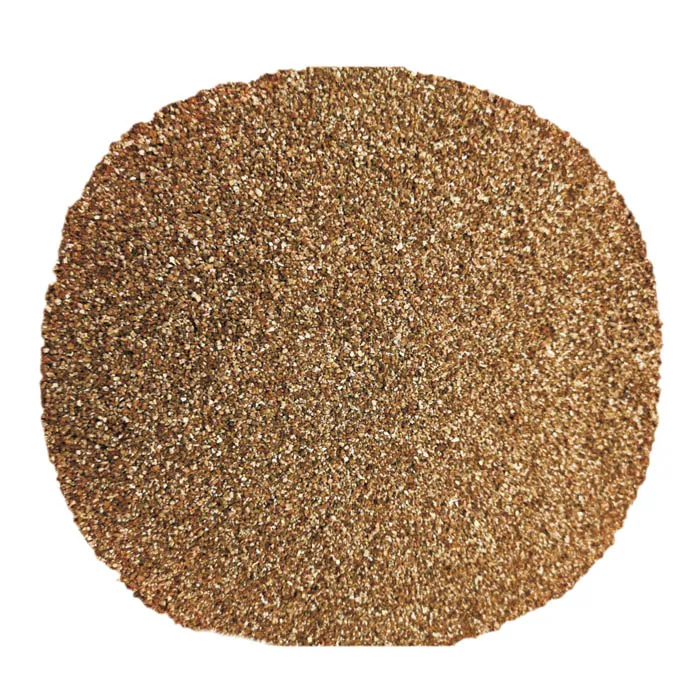Mag . 13, 2025 09:46 Torna alla lista
Discover the Power of Vermiculite: A Game-Changer in Construction and Gardening
As industries and home gardeners seek efficient, sustainable materials, Vermiculite continues to stand out as a superior choice. Known for its lightweight nature and excellent insulation and absorption properties, Vermiculite is quickly gaining traction across construction, agriculture, and environmental sectors.

Expanded vs. Unexpanded Vermiculite: Understanding the Difference
The performance of Vermiculite largely depends on whether it is in its expanded or unexpanded form. Unexpanded Vermiculite is a raw, mineral-rich material extracted from mines. It appears as a dense, flaky substance and is primarily used in its processed form.
When heated to high temperatures, unexpanded Vermiculite undergoes a remarkable transformation. It expands up to 30 times its original volume, turning into expanded Vermiculite. This puffed, lightweight version exhibits excellent thermal insulation, water retention, and aeration qualities, making it ideal for use in vermiculite for gardens, lightweight plasters, and vermiculite concrete applications. Expanded Vermiculite also serves as a reliable medium for packaging, fireproofing, and absorbents due to its expanded surface area and non-combustibility.
Vermiculite vs. Perlite: Which Performs Better?
Both Vermiculite and perlite are staples in horticulture and lightweight construction, but they serve different purposes based on their structure and behavior. Vermiculite for gardens offers superior water retention and nutrient absorption, ideal for moisture-loving plants and seedlings. Its layered structure can hold several times its weight in water, slowly releasing moisture back into the soil.
Perlite, on the other hand, is a volcanic glass that promotes superior aeration but lacks the same water-holding capacity. While perlite is preferred for plants requiring dry, well-drained conditions, Vermiculite excels in retaining both moisture and nutrients—especially beneficial in vermiculite concrete, where it contributes to consistent curing and strength development.
For gardeners and construction professionals aiming for balanced water retention, root protection, and insulation, vermiculite for sale remains the more versatile and dependable option.
Quality Assurance: 5 Essential Testing Indicators for Vermiculite
When choosing Vermiculite, quality is paramount. Reputable vermiculite for sale should pass several key quality indicators to ensure safety and performance:
Expansion Ratio: Indicates how much the raw material has expanded. High-quality Vermiculite should expand at least 8-10 times its original size.
Thermal Conductivity: Critical for vermiculite concrete used in insulation layers, low conductivity ensures excellent thermal performance.
Moisture Retention Rate: High-quality Vermiculite for gardens must absorb and retain water efficiently.
pH Neutrality: Properly processed Vermiculite should be close to neutral (6.5–7.2 pH), ensuring compatibility with a wide range of plants and construction materials.
Impurity Levels: Heavy metals and asbestos contamination must be absent. Certified vermiculite manufacturers ensure their products meet international safety standards.
These indicators are not only vital for end users but also define the pricing and classification criteria for any vermiculite for sale on the market.
Where Performance Meets Purpose: Applications from Gardening to Construction
The versatility of Vermiculite is unmatched. In horticulture, vermiculite for gardens is used to improve soil structure, boost water retention, and support seed germination. Its natural pH buffering and cation-exchange capacity make it ideal for retaining fertilizers and minerals.
In the construction sector, vermiculite concrete has revolutionized the concept of lightweight, fire-resistant building materials. Its ability to create insulating screeds, lightweight roof decks, and acoustic dampening layers has made it a go-to material for architects and civil engineers. Expanded Vermiculite is also crucial in fire protection boards and passive fireproofing systems.
For resellers and suppliers, sourcing from top-tier vermiculite for sale distributors ensures consistent quality and cost-effective solutions tailored for diverse applications.
Vermiculite FAQs
What is the main difference between unexpanded and expanded Vermiculite?
Unexpanded Vermiculite is a dense mineral in its raw form, while expanded Vermiculite is the result of heating it to high temperatures, causing it to expand and become lightweight and porous.
Is vermiculite for gardens safe for all types of plants?
Yes. Vermiculite for gardens is pH-neutral and retains moisture well, making it suitable for seed starting, root propagation, and soil conditioning for most plant species.
How does vermiculite concrete compare to traditional concrete?
Vermiculite concrete is significantly lighter, offers excellent thermal and acoustic insulation, and is easier to work with in insulation and fireproofing applications compared to traditional concrete.
How does Vermiculite compare to perlite in water retention?
Vermiculite retains much more moisture than perlite, making it ideal for plants and applications that require a consistent water supply, whereas perlite is better for drainage and aeration.
What is the typical wafer type check valve price for industrial use?
Although unrelated to Vermiculite, pricing depends on valve specifications. For Vermiculite, however, prices vary by grade, expansion rate, and packaging size. Always consult reliable vermiculite for sale sources for accurate quotes.
-
Strength with Premium Steel and Calcined Bauxite
NotiziaJul.28,2025
-
Revolutionize Construction Efficiency with Smart Industrial Materials
NotiziaJul.28,2025
-
Redefined with High-Grade Iron Powder Solutions
NotiziaJul.28,2025
-
Metallurgical Efficiency with Innovative Recarburisers and Covering Agents
NotiziaJul.28,2025
-
Industrial Efficiency Enhanced with High-Performance Recarburizer Solutions
NotiziaJul.28,2025
-
Boosted by Advanced Iron Powder and Carbon Additive Solutions
NotiziaJul.28,2025
